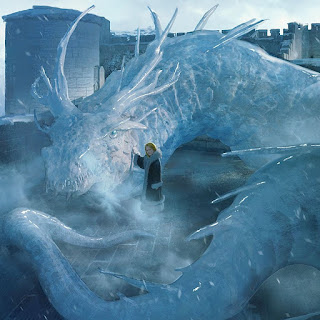Okay, here's what I managed to find in my neighborhood. (See here, here, here, here, and here.)
1. The Chrioniad
An ancient epic in the Homeric style, dated to shortly after the Illiad. Describes the end of the Trojan War picking up from the burial of Hector. Most of the piece describes three battles in intricate detail, in which ten of the gods and several of the mortal characters are slain. Zeus survives and takes on the name Elos, and appoints the Trojan prince Abramon as the king of Troy after he sacrifices his son and thirteen bulls to Zeus.
2. Appendix N Draft
An in-house draft of the appendices section of the original Dungeon Master's Guide, recovered in an office once run by TSR. The draft is typed onto loose sheets of hole-punched paper, with frequent editing notes in pencil. Most of the notes center around the first appendix, dedicated to a rather technical and rote dungeon generation procedure. There are two notes in Appendix N, "Inspirational and Educational Reading." The first, circling "Unaussprechlichen Kulten," reads "good joke, Gary." The second, circling a title and author now redacted, reads "This is NOT. We agreed not to even talk about this junk!!" The final appendix, listing different types of calendars and clocks, has a note recommending its total deletion.
3. Rumpelstiltskin
A low-quality video file, filmed on a handheld camera. The camera operator is filming a televison, showing sections of a independent horror film titled 'Rumpelstiltskin." The scene shown in an interview with the Rumpelstiltskin character, giving a rant that puts one in mind of Tyler Durden or 2019's Joker film. Sneering and breathing heavily, the camera operator carries the camera out of the living room which contains the television, climbing a carpeted staircase and opening a door to a bedroom. We see a man waking in his bed who resembles the interviewer in the film, obvious surprised. The operator begins to scream, which is quickly cut off as the camera is turned off.
4. Rayy Tablet
A partial fragment of the Epic of Gilgamesh, describing the offenses of Gilgamesh as king before meeting Enkidu. In addition to wanton violence, he is described as having profaned a temple to Enlil with insufficient sacrifices (because they were crippled?), introspecting (?), waging war on the people "above" Ur and taking one of their "thirds" (?) as a wife. This tablet is the oldest version of the epic yet uncovered, dated to 3000 BCE.
5. Flight Footage
A silent, short clip taken on an early cell phone showing the view from an airplane window. The plane is sharply descending, and in the final frames is shown to collide with what is recognizably the US Capitol Building.
6. FIVE AMAZING SHAPES (THE LAST WILL DRIVE YOU IN$ANE)
A Youtube video, twelve years old, will a little over 100,000 views. Features three disembodied voices discussing geometry and four-dimensional shapes, with frequent diversions and corny jokes. Despite explaining that it is impossible for humans to visualize four-dimensional shapes, the voices narrate as simple computer-generated graphics depict a series of such shapes, beginning with a hypercube. Despite the title and the inexplicable depictions, no viewer has exhibited any sign of serious harm from watching the video.
7. Magic Trix
Several shots of two boys, apparently related, performing minor illusions. Only one appears at a time, and the film seems to be shot in and around a small home in the mid-2000's. About two minutes into the seven minute video, the older boy declares "This magic is for babies. Let's see what a real wizard can do!" This leads into a section where slightly more advanced illusions, including those which can only be accomplished with simple video editing, take place. When the older boy performs a trick in this section, the camera notably shakes. When the younger boy performs a trick, he appears obviously reluctant, and the flourish is accompanied by full-body shivers. In one take, blood runs from his nose and he starts to ask the other boy a question-- "Can we please--"
8. Miranda
A complete manuscript of a novel discovered in the writing desk of a recently deceased Virginian politician in 1800. In an epistolary framing narrative, a classical scholar describes how he came to uncover an ancient account of a woman who lived in poverty during the time of the Roman Republic. Descriptions of the marble-shrined city in which she lives have been interpreted by a constitutional scholar as the inspiration for many of the landmarks and features of Washington, D.C.
9. Scan for Anomaly
An audio file of the 1969 moon landing on a collection of cassette tapes. When Armstrong or Aldrin speak while on the moon's surface, the soft sound of singing voices can be heard. The song performed has been identified as an adhan. There is a period of 40 seconds of silence shortly after Armstrong's famous "one small step" line.
10. Police Report: Forced Entry as St. John's Lodge 117
Records from the Hartford Police Department regarding an incident in November, 1976. The report includes a photograph of intricately painted letters on a wood-paneled wall: "BLAKE WAS FORTHRIGHT IN ALL HIS WRITINGS." In the report, Detective Alan Davis reports an alleged break-in of the Masonic Lodge by reporter Dierdre McOwens. She claims to have taken the photograph. Members of the lodge claim that she graffitied the message on their wall and that she has threatened them in the past.










